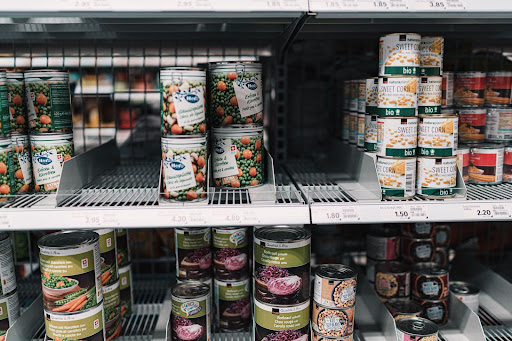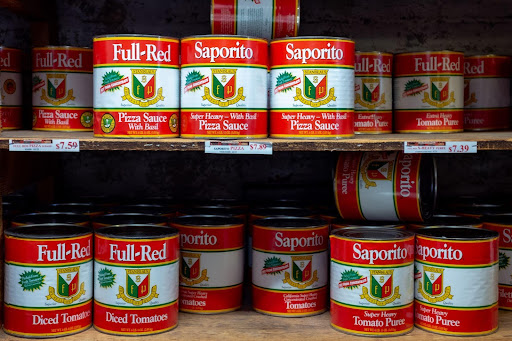Amazing Facts
How are The Nutrition Levels Affected By Canning?

Are Canned Food Healthy?
Fresh or frozen foods are typically regarded to be more healthy than canned ones. According to some people, they contain dangerous substances, and it will be good if you avoid them. Others argue that canned food items can be a beneficial addition to one’s diet in The Nutrition Levels.
In this article, we will go over everything you should know about canned goods and The Nutrition Levels:-
What is Canned Food?
Canning is a sure way of storing food items in airtight vessels for long periods. Canning was invented in the late 18th century to ensure a consistent food supply for troops and sailors at war. Although the canning process varies slightly depending on the product, there are three essential processes. These are some of them:
Processing: In this stage, food items are sliced, chopped, boned, pitted, cooked, or shelled.
Sealing: Cans are used to store processed food.
Heating: To destroy any possible hazardous microorganisms and avoid spoiling, cans are then thoroughly heated.
This permits food to last for 1–5 years of shelf life. It will be considered safe to eat within that time span. If you are looking for accessories for your bottled and jarred packaged goods, you should contact a can manufacturing company.
Vegetables, fruits, soups, beans, shellfish, and meat are all some of the common canned foods found in the supermarket.
How are The Nutrition Levels Affected By Canning?
Canned meals are frequently assumed to be less nutritious than fresh or frozen foods. However, studies demonstrate that this is not always the case.
In fact, canning maintains the majority of The Nutrition Levels in a meal.
1. Fat-Soluble Vitamins
The process does not affect protein, carbohydrates, or fat. The majority of minerals and fat-soluble vitamins such as vitamins D, A, K, and E are maintained.
As a result, research shows that foods strong in specific nutrients can effectively maintain their concentration of nutrients even after being canned for several months.
2. Water-Soluble Vitamins
Water-soluble vitamins like vitamins C and B, on the other hand, might be destroyed by the high heat used in canning. As Vitamins B and C are both quite reactive under heat and air, their effectiveness might be lost during the process of cooking, canning, or storing.
While the canning process may destroy some vitamins, it may boost the amount of other beneficial chemicals. When tomatoes and maize are heated, they release more antioxidants, making canned versions of these foods items an even more significant source of antioxidants.
Aside from variations in individual nutritional levels, canned food items are a wealthy supply of various essential nutrients and vitamins.
Canned Food Items Are Very affordable and Easy to Use
Canned meals are pretty easy to handle and a practical approach to increase your intake of nutrient-oriented food products.
Many sections of the world still can’t enjoy the experience of consuming high-quality foods. Canning food items helps to ensure that those individuals can also enjoy the benefits of a wide range of nutritious foods.
In fact, almost any meal can now be found in a can. Canned meals are also extremely practical because they can be stored safely for several years and sometimes need little preparation work. Furthermore, they are less expensive than fresh items.
Canned Food Might Contain BPA
Bisphenol-A (BPA) is a certain kind of chemical compound that is commonly used in the process of packaging food items, such as cans or airtight containers.
High amounts of BPA might be harmful to the human body, therefore quality management becomes very essential for canned food items.
BPA from various canned food items has been shown in studies to transfer from the can’s lining and affect the quality of the food items present inside the can.
One researcher looked at 78 canned items and discovered BPA in almost 90% of them. Furthermore, studies have shown that eating canned foods is a major source of BPA exposure.
In a particular Study, few candidates are given one serving of soup daily. The ingredients of this soup were canned previously. And after five days of continuing the study, the results have shown that the BPA concentration in their urine increased by almost 1000 percent.
Various studies have proved the connection between BPA and various health issues such as type 2 diabetes, male sexual dysfunction, and cardiovascular disease, despite the data being conflicting. Seeing all these studies, it is safe to say that consuming too many canned food items might not be a good idea.
Canned Food Items Might Contain Harmful Bacterias
While it’s exceedingly unusual, canned foods that haven’t been properly prepared could contain Clostridium botulinum, a hazardous germ.
Consumption of tainted food can result in botulism, a dangerous infection that can result in paralysis and death if not treated. Improperly canned foods at home cause the majority of botulism cases. Botulism caused by canned food items that are sold on a commercial level is quite rare.
However, to be on the safer side, try to avoid consuming food items from a can that is cracked, leaking, bulging, or even dented.
Canned Food Items Might Contain Added Sugar and Preservatives

In various canned food items, considerable amounts of sugar and preservatives are added to make it last longer. Some canned goods have a lot of salt in them. While most consumers are unaffected, some of them who have had a high blood pressure problem may experience some issues.
They may also contain additional sugar, which has the potential to be dangerous. Consuming vast amounts of sugar has been linked to type 2 diabetes, a higher risk of obesity, and cardiovascular disease. Other natural or artificial preservatives could be applied as well.
Final Thoughts
It’s crucial to check the label and ingredient list before eating anything. In most of the canned food items, the ingredients are mentioned on the can. You can consider choosing canned items which have a lower concentration of salt and sugar. Choose fruits that are canned in water or juice rather than syrup to prevent added sugar.
Foods can be desalted and de-sugared by draining and rinsing them. Many canned foods have no extra ingredients at all, but going through the list of components every time you buy canned items is the best way to be safe.

















































